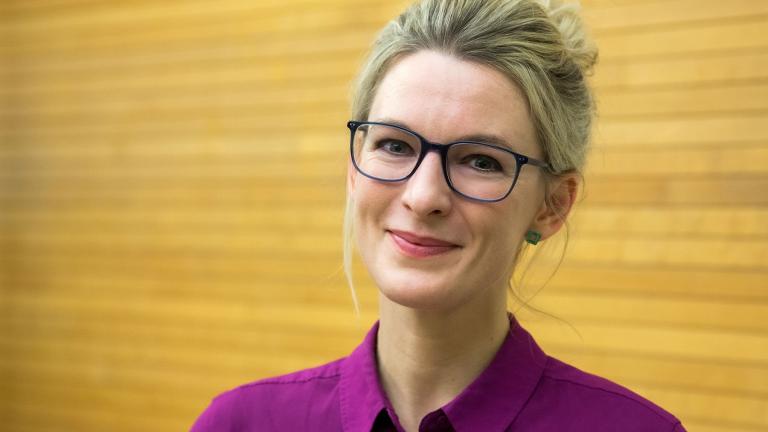
Amy Moran-Thomas, the Alfred Henry and Jean Morrison Hayes Career Development Associate Professor of Anthropology at MIT, has been awarded the 2020 Levitan Prize in the Humanities. The $29,500 grant will support Moran-Thomas’s project “Mine: A Family History of Place, Race, and Planetary Health,” which Moran-Thomas writes will “excavate the cultural histories and everyday social fabrics behind the deep sedimentation of American generational identities and fossil fuel legacies.”
Moran-Thomas is a cultural anthropologist whose work specializes in the human and material entanglements that shape health in practice. Her first book, “Traveling With Sugar,” was published in late 2019. That project examined the rising world diabetes epidemic as part of a 500-year bodily legacy of plantation landscapes. With “Mine,” Moran-Thomas will again investigate the tangled intersection of human and planetary health, though with a focus closer to the personal.
Racialized divides in the U.S. political theater
“This new project broadens out to acknowledge an interconnected story about complacency and climate change from my own home,” writes Moran-Thomas. She grew up in Pennsylvania, a contentious swing state well-known for its history of extracting coal, oil, and natural gas from the Earth. “Yet today, mining has also become a polarizing flashpoint of racialized divides in U.S. political theater: reanimating reworked tropes of ‘white working class’ voters, on one hand; and iconic of intensifying climate change and its unequal impacts on the health of people and places, on the other.”
Part of what shapes the stage for this investigation is the plentiful amount of coal in American soil. The United States contains more coal than any country in the world. As experts wrote in 2016, a continued reliance on coal could be fueled by that plentiful American supply, resulting in dire outcomes for human and environmental health.
The project “offers a ‘relational ethnography’ that builds outward from my family’s trajectories across generations growing up in a deeply divided swing state,” writes Moran-Thomas. “Following the various ways carbon gets embodied across scales of bodies, lives, homes, towns, infrastructures, eras, atmospheres, and landscapes, the book’s descriptions will uneasily probe larger questions of ‘slow violence’ and segregation, by populating broad terms like settler colonialism and hydrocarbon toxicity with the jarring intimacy of a kinship story.”
“Amy’s work is both necessary and urgent in the face of this challenging moment in America,” says Melissa Nobles, Kenan Sahin Dean of the MIT School of Humanities, Arts, and Social Sciences. “In a time of division, such keen and multi-faceted anthropological work opens the door to meaningful insight about our nation’s communities.”
The tension between scientific evidence and cultural heritage
This research speaks to the ongoing tension around the climate crisis: scientific proof, Moran-Thomas notes, continues to accumulate. However, the United States remains notoriously slow to enact policies in response to the urgent data. Underlying the political and economic tensions of this delay, it is also important to acknowledge the less-tangible cultural dimension of climate denialism.
While the corporate and political interests of climate denialism may be the most visible aspect in the eyes of the public, those interests may not have the most lasting effects on the nation and the planet. Rather, beyond the hyper-rational debates of “jobs versus environment,” Moran-Thomas will consider the cultural underpinnings that have allowed anti-science propaganda to gain traction in America and continue in the face of mounting evidence.
“It is a longstanding anthropological truism that the most impactful grids of culture often remain unsaid or implicit,” she writes. “Deep-seated intergenerational memories and historical investments frequently shape human practices long after pragmatic situations change.”



